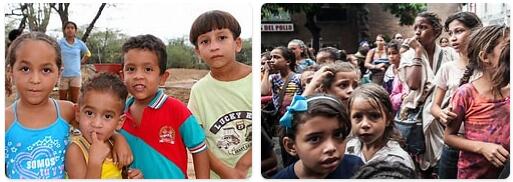Yearbook 2016
Venezuela. The current population of Venezuela is 28,435,951. The already tense political situation in Venezuela deteriorated further in the second half of the year. The political opposition MUD (Democratic Consensus Assembly), led by Henrique Capriles, concentrated its efforts on deposing President Nicolás Maduro with constitutional means. Although MUD dominated the Congress and could in principle vote for his departure, at the same time the government controlled the Supreme Court which would have the final say in such a process, which became clear by the Congress’s decision to dismiss the Minister of Food at the beginning of the year.

Instead, the opposition focused on getting a referendum on the president’s position. For that, naming lists of 20% of the electoral corps were required, ie 3.7 million signatures, and in early September a protest march was organized in the capital Caracas with one million participants in support of the demands. In August, however, the national electoral authority declared that it would not be possible to meet the opposition’s demand for a referendum in due time.
In October, the political crisis accelerated significantly. The electoral authority first announced that the regional elections scheduled for December would be postponed to next year. Only a few days later, the opposition’s name collections were rejected with reference to alleged cheating. MUD in turn accused the electoral authority, in whose leadership four out of five members are also linked to the government, for political manipulation under the bureaucratic cover. On October 23, a turbulent debate was held in the opposition-dominated Congress, which decided to work to replace the members of the electoral authority and also urged the military not to obey the government’s orders, whereupon members of the ruling party, under chaotic forms, suspended the debate. Supreme military chief Vladimir Padrino López responded by explaining the military’s relentless loyalty to the government.
The contradictions were so strong that several foreign mediators were allowed to step in and facilitate the dialogue between the government and the opposition. Among them were Spain’s former prime minister José Luis Rodríguez Zapatero, two former presidents of the Dominican Republic and Panama and representatives of the Vatican.
At the same time, Venezuela’s economy was in deep recession, partly due to a record low oil price. OPEC’s decision in early December to reduce oil production to raise oil prices seemed to be able to ease the economic situation in Venezuela somewhat. But the main cause of the country’s economic crisis was considered to be the institutional chaos. The International Monetary Fund (IMF) predicted negative growth for the year of as much as 10% and an inflation rate of as much as 700%. The IMF also noted that its forecast for Venezuela for 2017 (-4.5%) should therefore be revised.
Economics and political reform
When Chávez came to power, the Venezuelan economy was in a state of collapse due to international economic cycles, falling oil prices, corruption and a failed economic policy. Political reform and the historically high oil price in the 2000s gave the economy a big boost.
In line with the Chávez government’s ambition to reverse the privatization of national businesses made in the 1980s and 1990s, a number of state acquisitions were made, including electric and telecommunications and foreign major banks in Venezuela. The government also took control of the state oil company PDVSA in 2003, and renegotiated agreements with foreign oil companies, including Statoil.
According to thereligionfaqs, a controversial measure was the expropriation and redistribution of land that was broken, as well as forced acquisition of key companies in the heavy industry. In the countryside, the land was transferred to local small farmers, which aroused great opposition from powerful landowners and their supporters.
Poverty reduction and social movements
Well-helped by historically high oil prices, the Chávez government invested a great deal of resources on poverty reduction and socio-economic inequality reduction. Key measures were social housing, pension reforms and access to university education for wider groups of the people. In 2003, a number of social programs (mission socials) were launched, including in primary health care, food distribution, education and work training programs, and sports and culture.
Social movements with roots in the poorest sections of the population were greatly strengthened under Chávez. Many participated in the organization of the social programs, and from 2006 in newly created government-funded bodies for locally run development and infrastructure projects, called the municipal council (consejos comunales).
Elections under Chávez
During the Chávez era, 15 elections and referendums were held, including a new constitution passed in 1999 following a comprehensive process of popular consultations. Chávez won the presidential election four times by a large margin in 1998, 2000 (the new constitution of 1999 required that a new election be printed), 2006 and 2012.
The Chávez government’s only electoral defeat came in 2007, when they lost a referendum on constitutional amendments that meant the president could run for election an unlimited number of times. Two years later, however, the constitutional amendment was introduced, and the opposition feared that Chávez could be seated for life. The opposition regularly made accusations of electoral fraud, but this was refuted by international observers, including the Carter Center.